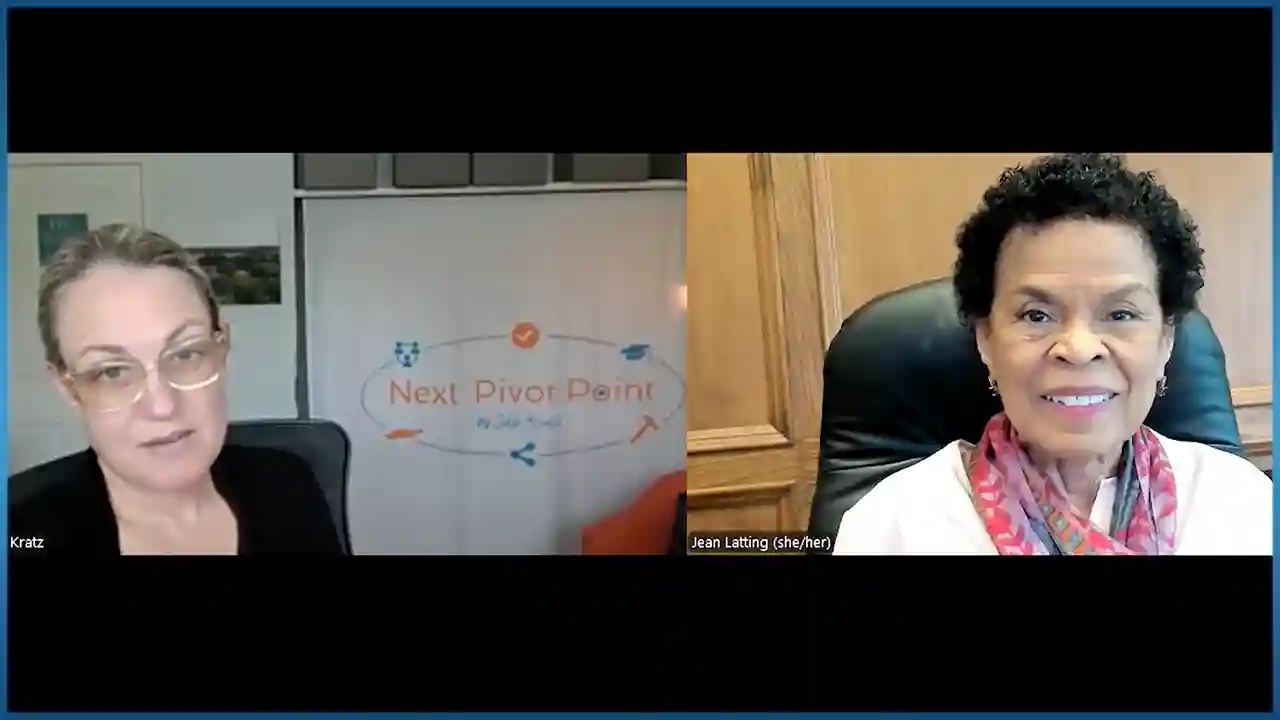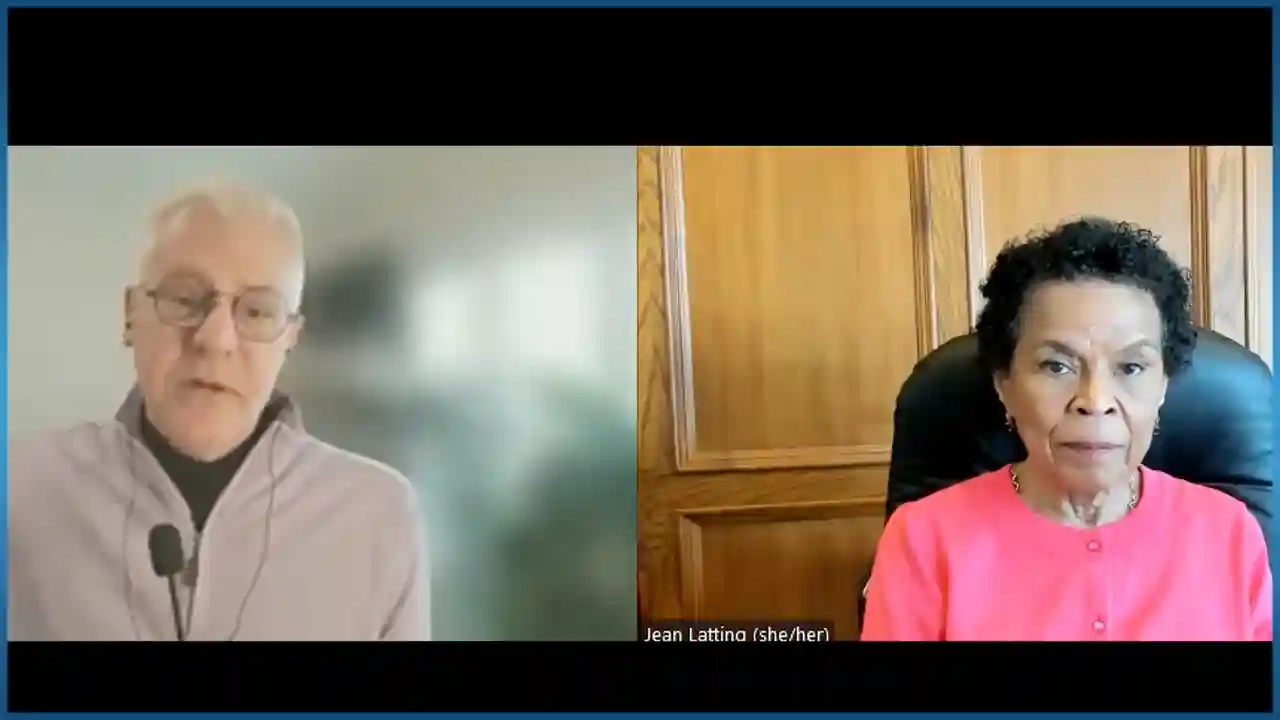


Jean Latting
Julie Kratz, a renowned expert in allyship, discusses strategies for fostering inclusive leadership and engaging those who are persuadable but uncertain.


Jean Latting
Dr. Brad Johnson, a White male clinical psychologist who has spent most of his professional life learning and teaching how to encourage female talent.


Jean Latting
Dr. Beth Kaplan, in her introduction to her new book Braving the Workplace: “I know what it's like to be unseen, unheard and unhappy."


Jean Latting
Suneel Gupta will tell you that finding everyday dharma in the midst of a challenging life is not measured by outward success, nor by achievement, but by finding your essence.


Jean Latting
Jean interviews Craig Dowden, author of A Time to Lead: Mastering Your Self… So You Can Master Your World and positive psychology coach.


Jean Latting
Jean interviews Minal Bopaiah, author of Equity: How to Design Organizations Where Everyone Thrives. She has much to say about the long and complicated path for DEI.


Jean Latting
What do these two historically oppressed groups, Holocaust Museum Houston and the Kinsey Collection of African American Art, have in common?


Jean Latting
Houston mourns Rev. William Lawson, founder and pastor emeritus of Wheeler Avenue Baptist Church.


Jean Latting
Lisa Fain speaks with Jean about the growth potential for mentors and mentees when they truly speak with, listen to, and respect each other’s personhood.


Jean Latting
Instead of being shamed for an error you made, you were supported in redressing the situation. How did it affect your sense of responsibility and ownership?


Jean Latting
In this podcast, Hamza Khan and Jean Latting engage in an animated conversation about leadership, resilience, belonging, and burnout.


Jean Latting
Jean addresses an issue in publishing her new book where she was confronted with the highly offensive misdeeds of one of her heroes. Read how she worked her way through it.


Jean Latting
Amri Johnson has a few provocative things to say about the current state of efforts toward diversity, equity, and inclusion.


Jean Latting
Jean sums up her history of optimism, the arc of social justice, and the deliberate steps one has to take to keep an eye on the prize.


Jean Latting
Jean discusses transitional justice and the race class narrative: what works, what doesn’t, and how to stay the course.


Jean Latting
Given our country’s long and difficult history with inclusiveness, Jean decided to sit down and write out her thoughts – during this year’s Black History Month.


Jean Latting
How do you self-identify? Our identities affect our allyship with those who are being marginalized because of one or more of their identities.


Jean Latting
Jean interviews Daniel Oestreich, co-author of two books on what to say to someone, especially people in the workplace, when you are afraid to say it.


Jean Latting
How do you even begin to articulate a goal that lights you up, not to mention working toward it? Jean has some thoughts.


Leading Consciously
We envision a world of peace, mutual support, and mutual responsibility, including intolerance for hunger, climate action, responsible news outlets, and compassionate leadership.


Jean Latting
Nina proposes susceptibility to harmful radiation and absorption of Vitamin D as the simple explanation for why people have different skin colors, a product of evolutionary adaptation.


Jean Latting
Jean started listening to Steve Kerr, coach of the Golden State Warriors, honing in on his leadership skills. She was blown away by his insights.


Jean Latting
Dr. Pratt learned how to follow the whisper of the spirit, work within and without the system, address racism and sexism head on, and promote impactful diversity initiatives.


Jean Latting
Brain fog is a trap we fall into when our emotional reaction to a negative experience keeps us frozen. If we don’t have tools to keep us moving, we get stuck where it hurts the most.


Jean Latting
In today’s world, leadership is not about telling people what to do. Rod McCowan trains leaders to consider moral principles when making decisions.


Jean Latting
Studies show the benefits of affirming our value, yet we hesitate to share these affirmations with others.


Jean Latting
Victor Varnado, born with albinism, chose to beat the odds stacked against him in life by using his comedic skills to pursue his dreams.


Mike Todt
The Gross National Happiness Index exists, and it works in Bhutan as well as other countries. Mike writes of his upcoming visit to Bhutan to see this phenomenon in action.


Jean Latting
Sherra Aguirre speaks with Jean about the leadership role she took on in her community to promote changing the typical African American diet.


Jean Latting
In June of 2023, the Supreme Court ruled against the use of affirmative action in college admission.


Jean Latting
Ilana Redstone says the Certainty Trap happens when we have moral principles we are 100% sure of and shut out any objections to the contrary.


Carole Marmell
We realized my brother was gay when his photo was on the cover of Time magazine titled “The Homosexual in America”.


Jean Latting
Elizabeth Melendez Fisher Good was burned out and ended up with a mission to address sex trafficking.


Jean Latting
Research shows that groups who put in the effort to welcome diversity and promote inclusiveness may have more conflicts but are also more productive and innovative.


Jean Latting
Joanna Cea and Jess Rimington wrote Beloved Economies: Transforming How We Work, that invites us to reimagine work and reimagine capitalism.


Jean Latting
The most successful people in any field know how to seek the expertise of other successful people in order to improve themselves and their performance.


Jean Latting
Dr. Melissa Ochoa has a few things to say about the word Latinx; mainly, she doesn’t like it. For one thing, it doesn’t work in Spanish. Hear what she proposes instead.


Carole Marmell
Unsung heroes are all around us. Many were women; in many cases, their work was known but men took the credit.


Jean Latting
After George Floyd's murder, Ronald McDonald House-Houston wanted to make a difference for their staff and also their families across the world.


Jean Latting
Journalist Talia Lavin began a social experiment aimed at understanding and exposing the White nationalist movement.


Jean Latting
What happens when you lead with love? Helen Stagg talks about how making change starts with honest, respectful, direct, and open conversations.


Jean Latting
What is the culture – police and American – that allows this to continue? What are the obstacles? What can we as individuals do about it?


Jean Latting
When disaster inevitably strikes, what is your response? Wait for someone to fix it, dwell on the unfairness of it all? What do you need to move ahead?


Dr. Melissa Ochoa has a few things to say about the word Latinx; mainly, she doesn’t like it. For one thing, it doesn’t work in Spanish. Hear what she proposes instead.


Unsung heroes are all around us. Many were women; in many cases, their work was known but men took the credit.


After George Floyd's murder, Ronald McDonald House-Houston wanted to make a difference for their staff and also their families across the world.


Journalist Talia Lavin began a social experiment aimed at understanding and exposing the White nationalist movement.


What happens when you lead with love? Helen Stagg talks about how making change starts with honest, respectful, direct, and open conversations.


What is the culture – police and American – that allows this to continue? What are the obstacles? What can we as individuals do about it?


When disaster inevitably strikes, what is your response? Wait for someone to fix it, dwell on the unfairness of it all? What do you need to move ahead?


It’s the new year, and we all have good intentions. What about our determination to stop procrastinating now?


May all your tomorrows be filled with peace, love, and joy.


What if you had no inner critic telling you you’re just not good enough? What if you learned to silence your inner critic? What could you accomplish?


To some Native American peoples, it’s a “day of mourning”; how can we still practice Thanksgiving as a day of gratitude?


Ethical behavior in corporations include anticorruption, sustainability, human rights, culture and behavior, and employee and stakeholder engagement.


The polarization in this country has grown so vast that words we use in common do not mean the same things. Is there any hope for bridging the divide?


Dina Gilio-Whitaker answers what would be lost if Indigenous people were completely assimilated into White society and if they would even be accepted?


As initiators of change, the ICTJ works with victims and survivors of massive human rights violations to hold those responsible to account.


Our online membership program, Pathfinders: Leadership for social and racial justice, uses the blog posts for members to read, reflect, and discuss.


Brian talks about the Baldrige framework, how it changed American business, and the need to hardwire equity and inclusion into business practices.


Jean talks about three common breakdowns in email communications, how to handle them to avoid rework, and reduce stress and anxiety in the workplace.


The California Reparations Task Force is seeking reparations to overcome the legacy of privileged whiteness and racism in this country.


We are living in turbulent times. What to do? How to cope? How are each of us in Leading Consciously coping?


Dr Bonnie McGill is on a mission to make indigenous people visible again.


Today’s guest blogger explores the meaning – both literally and emotionally – of finding your way through the profusion of labels and why they matter.


Jasmin has written about generational trauma and her own experiences with it as the child of American Black and Caribbean Black parents.


This post explores how "not changing much" in the past three years proved that I did, indeed, take some huge risks.


Dave's novel approach toward disrupting the school to prison pipeline and his ability to understand multiple cultures brings him to this interview.


More people at the societal level are questioning if the best person always wins. We’ll explore monopoly as meritocracy and what is truly best.


This discussion covers the roots of racism, who suffers from it, and what can be done about it. Spoiler: it’s not just people of color.


For Women’s Month, we wanted to share this blog for women everywhere who may have feared (as we have) that we are not good enough.


Dr. Kira Banks talks about her work with internalized oppression, what she calls appropriated racial oppression.


Stephen B. Karpman’s drama triangle represents a pattern of dysfunctional relationships. It can exist in domestic situations and in the workplace too.


Jean asks André Harris about his sickle cell, his experience with sexual assault, and his ability to thrive where others might have given up.


How did Afrophobia get started, what are the signs it actually exists, and, especially, what can we do about it?


Are you consumed by work? And how can you produce excellence without burning out? Francine Derby has a lot to say about it.


A barrier to racial understanding is the fear of exposing oneself. What if we could find a safe place to have these uncomfortable conversations?


John Fisher depicts the emotional roller coaster we ride during a change. Jean uses the graphic to illustrate her journey toward realizing a vision.


Leading Consciously can help you in emotional suppression & engage in powerful listening.


What does it mean to develop an awareness of racism, starting to see things differently, interpret history differently, identify causes differently?


Amy Porterfield's honest and difficult journey with her commitment to justice, her missteps and along the way, the model of a very public apology.